A kick away from a grand final, Brenton Sanderson found himself sacked just two seasons later. And it was the departure of Kurt Tippett that set off the Crows’ fall from grace.
Brenton Sanderson came agonisingly close to a Grand Final appearance in his first year as Adelaide coach, only to be cruelly denied.
With five minutes to play in the 2012 preliminary final against Hawthorn, the Crows led by a point before relinquishing the lead.
Then a late goal from a young Taylor Walker brought them to within five points with 16 seconds left, before time ran out.
“I was shattered,” Sanderson told the Sacked podcast, in his most revealing interview since his tumultuous three-season term as Adelaide’s senior coach ended in late 2014.
“(The players) were obviously distressed. We lost the game, but by God, we went down swinging. As heartbreaking as it was, I had enormous pride in what those boys had done.”
Sanderson had every reason to think himself a long-term senior coach and his young team as a premiership contender for years to come.
What could possibly go wrong? As it turned out, almost everything …
Within weeks star forward Kurt Tippett sought a trade and it unravelled a salary cap scandal that rocked the club and brought on crippling draft sanctions.
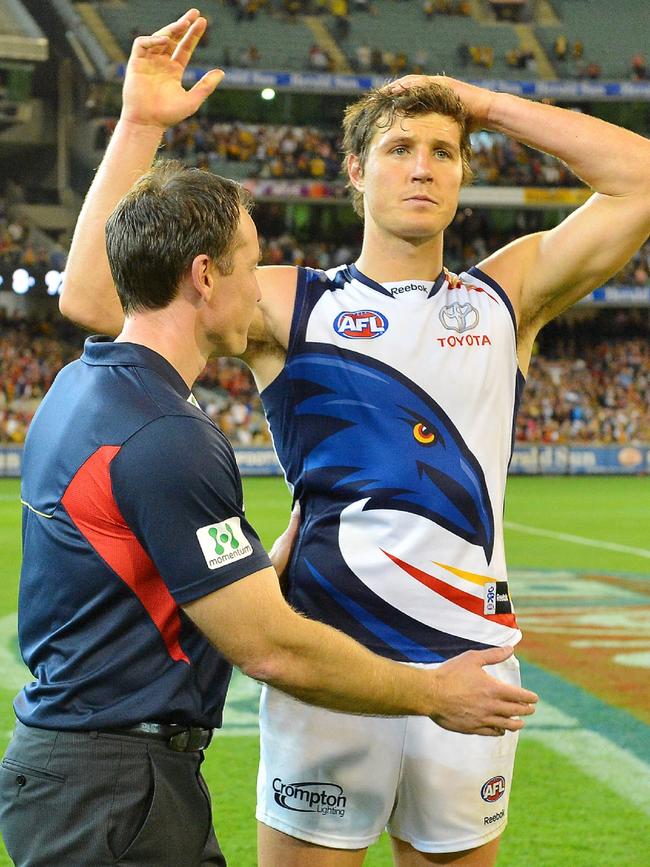
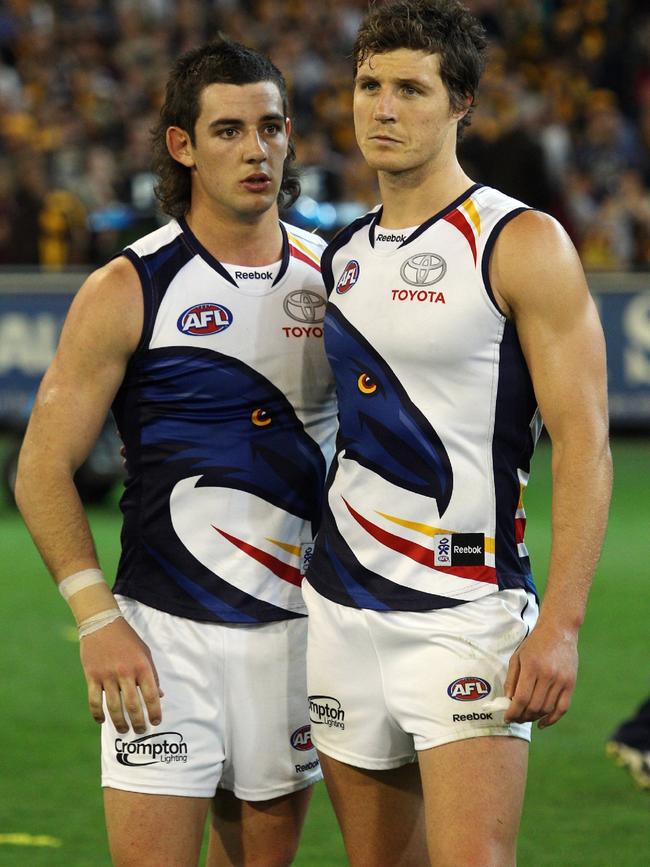
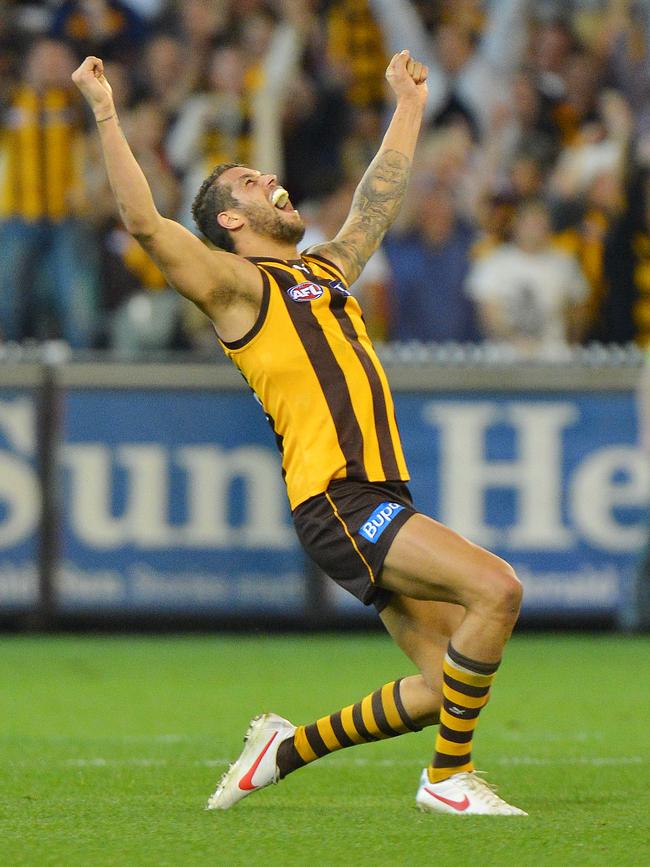
Walker’s knee blew out early the next season.
Sanderson’s coaching sounding board Dean Bailey was suspended by the AFL and then tragically lost to cancer.
And as the pressure mounted on the normally-affable Sanderson, he turned so insular that family members feared for his welfare.
It was the recipe for the most brutal sacking in Adelaide’s history, according to former club great Chris McDermott, despite his 56.5% win-loss record from 69 matches.
But Sanderson isn’t one for self pity, acknowledging his own response to the pressure and his failure to delegate partly contributed to his downfall.
“That’s the industry we work in,” he said of the lessons he learnt. “If you accept the role as senior coach, you have to be prepared that one day, you’re going to lose your job.
“And there’s going to be people who want to talk to you and you’re going to be embarrassed. But you’ve got to hold your head high and understand you did the best job that you could do and get on with the next challenge.”
Sanderson hopes his story can be a lesson for today’s overworked, under-resourced AFL coaches who often feel claustrophobic inside the all-encompassing footy bubble.
KURT CURSE
Tippett kicked a game-high four goals in that 2012 preliminary final loss, but it would prove his final game for the club.
“I hope at no point this ever sounds like I’m going to provide excuses here … but we certainly had some challenges,” Sanderson said.
“Our best forward at the time, Kurt Tippett, … notified the club he wanted to go to Sydney. And I said to the CEO, ‘How can this happen?’
“Then it came out at the time that he had a clause in his contract that he could be traded, which was a breach of AFL rules.”
The Crows not only lost Tippett, but the subsequent salary cap scandal saw them fined $300,000 and banned from the first two rounds of the 2013 draft, having voluntarily relinquished their 2012 early selections.
“We lost all of our draft picks for the next two seasons, so we had no access to the best young talent,” he said.
“I’m in my second year (as coach) and I’m only 39. We lose our best forward and we lose our draft picks.”
The degree of difficulty increased when Taylor Walker did his ACL early the next season.
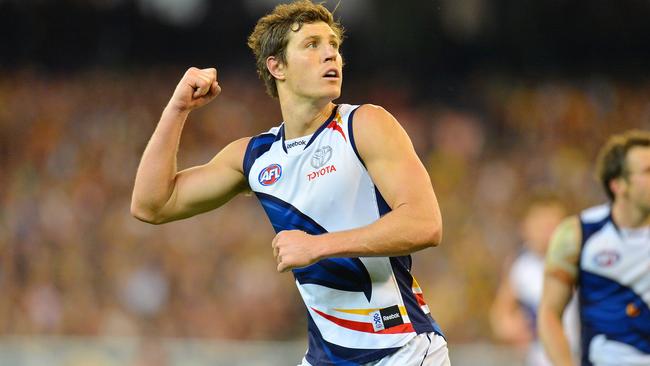
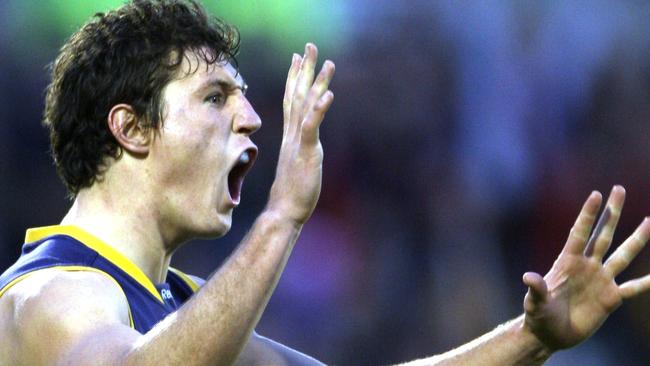
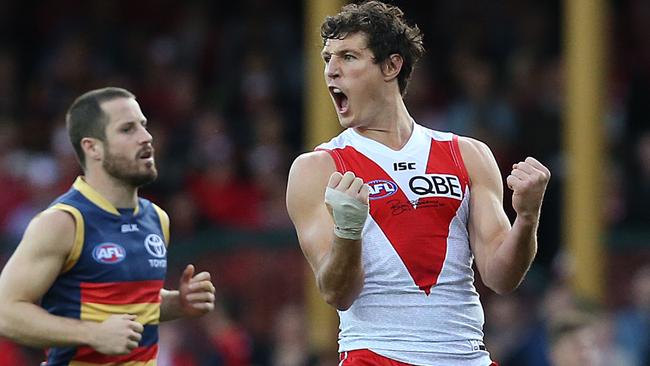
MOURNING A MENTOR
Dean Bailey was the perfect foil for Sanderson, acting as a cool head in a crisis for the young coach.
But the former Demons coach was banned by the AFL for the first 16 weeks of the 2013 season for “acting in a manner prejudicial to the interests of the competition” as part of Melbourne’s tanking allegations.
Bailey would then be diagnosed with lung cancer in late 2013. He was only 47 when he died just before the start of the 2014 season.
“It was heartbreaking,” Sanderson said.
“I still think about him a lot – as a friend and someone who I was really close to.
“At the end of (2013) we went to London together … to a coaches conference.
“He just started picking up this really wet cough. He went to the doctor and the first diagnosis was bronchitis.”
By the time they had returned to Melbourne – after Bailey had a brief holiday with his wife – things had deteriorated.
“Further investigation (would) show they picked up some cancer cells and (only months later) he passed away,” Sanderson said.
The heartache was immense for those who loved Bailey.
But as a coach under pressure, Sanderson had to put his personal pain to one side and keep on coaching.
“I was about to start my third year as a senior coach and I lost my right hand man, a man who had had a lot of experience as a coach,” he said.
“The group had to overcome his passing; it was tough, pretty tough.”
ROO’D END
Adelaide lost its first three games of 2014 as Sanderson’s trademark positivity was overwhelmed by an under-siege mentality. He worked harder, but not better.
He absorbed the pressure himself without delegating or seeking help.
“My weakness at the time was that I withdrew rather than sought counsel,” he said.
“The best coaches now (are) the best managers and have the ability to be able to work as a team and pull people together in times of crisis.
“I went the other way and I’ve (since) learned the hard way. I shut people out, I tried to do things myself. I’m normally very positive by nature, but at the time I was defaulting to this doom and gloom.”
The Crows finished 2014 with 11 wins, missing the finals for a second straight year, with Sanderson still hopeful he could turn the club’s fortunes around.
He never got that chance.
“Mark Ricciuto was appointed that season as footy director … and he was obviously evaluating the program,” Sanderson said.
“Part of his brief was to find a senior assistant. One of the people he interviewed was Phil Walsh. (Walsh) was the brains behind every great coach (he worked with) and his footy knowledge was incredible.
“Roo’ (Ricciuto) interviewed him and he was blown away. I think obviously what happened was that Roo said … ‘We’d love for you to be the senior assistant and work with Sando, but maybe you should be the coach’.”
Sanderson was called to a meeting with the Crows’ then chairman Rob Chapman.
“I left the room no longer the senior coach,” he said. “You hear the words ‘you are no longer the coach’ … and you’re trying to process these things in your brain.”
The shock of the sacking – just a year after he had received a contract extension – meant that there were “lots of rumours because people wanted to pin it on something.”
He said the rumours of a fall out with players were wrong: “there were some strange ones and some laughable ones as well. I felt I was close to that playing group.”
Having failed to listen to those closest to him while he was in the heat of battle, Sanderson thankfully took the advice that he needed to unpack what happened.
“That helped me a lot,” he recounted. “All of us have times in our lives where we’ve made decisions or mistakes when we haven’t processed them properly and we’ve moved on.”
“But I thought it was a great opportunity for me to publicly say ‘You guys might think it (the sacking) was pretty harsh, but there were a lot of things I could’ve done differently or better.
“I thought, ‘I’m going to learn from them and I’m going to educate myself better, so that the next time the opportunity comes I’m going to make sure that I’m better prepared.”
That opportunity came in the form of a Collingwood assistant coach and confidant of Nathan Buckley and took the pair of them to within a kick of a premiership in 2018.
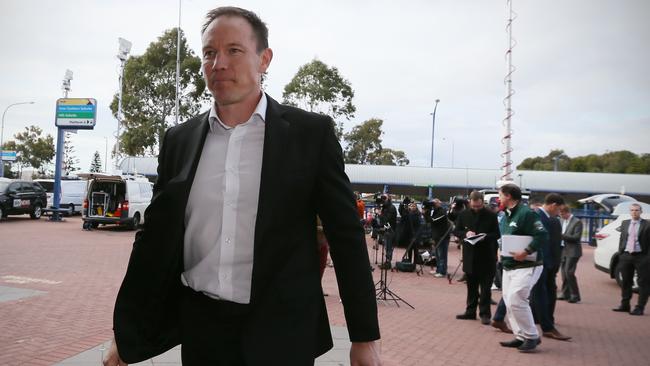
KID FROM ADELAIDE HILLS
Sanderson’s 2014 sacking wasn’t the first time he had been shocked at being moved on by Adelaide.
It happened to him as a player, too, when he was only 19.
Having grown up in Blackwood in the Adelaide Hills idolising his father as his local footy hero, Sanderson had been one of the 10 concessional players allocated to Adelaide’s inaugural playing list.
Injuries impacted him early, but he played six games for the Crows in 1992 and 1993.
Then senior coach Graham Cornes asked to come to the Sanderson family house during trade time.
“I never saw it coming,” Sanderson said, saying Cornes at least had the courtesy of driving out to explain.
“He said: ‘We have traded you to Collingwood’. I had never lived out of home before and I don’t think I had ever been to Melbourne before.
“I was very young on my journey but the opportunity to play for Collingwood, I thought, ‘Let’s do it’.”
A chance meeting with Buckley started a friendship that exists to this day.
“Just by chance, I ran into Bucks in Adelaide and he had just got poached by Collingwood. We ended up living together (in 1994) and we became friends from there.
“To see Bucks up close and to live with him for 12 months and to see how he went about it was great. We were still a couple of lads when we needed to be lads, but to be able to see someone as determined as him … I was very fortunate to see that up close.”
Then, after four games with the Magpies, Sanderson was called to a post-season meeting with Collingwood coach Leigh Matthews and footy manager ‘Gubby’ Allan.
“It was terrible, I was only there for 12 months,” he said. “It was a bit like that movie Moneyball where they say to a player ‘we’ve traded you to Geelong’. That’s pretty much all Gubby said before I was off down the Freeway.”
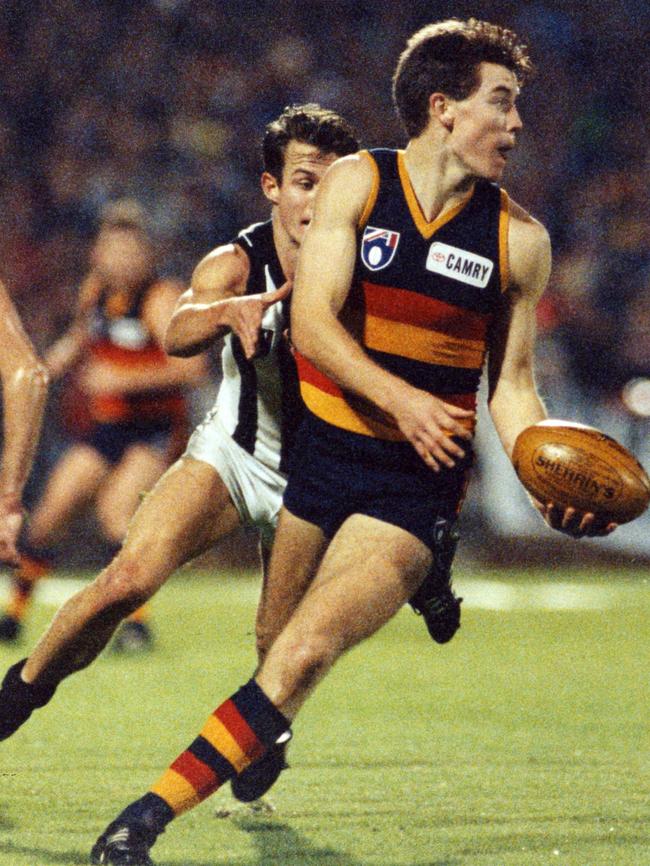
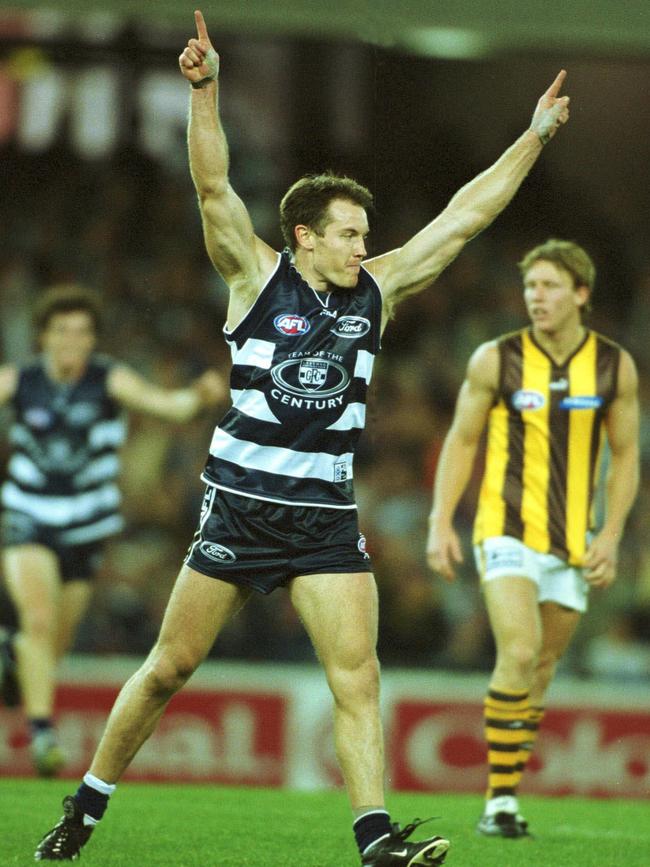
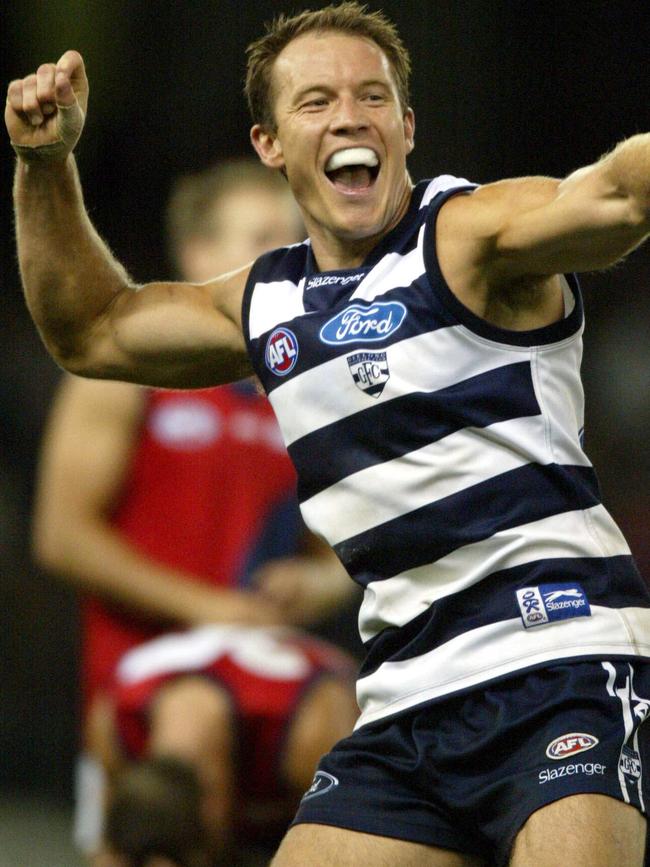
MISSING A GRAND FINAL
Sanderson found his feet in Geelong, developing into one of the club’s most reliable half backs.
He would go on to play 199 games with the Cats, taking his AFL tally to 209, winning the club’s 2001 best and fairest.
But it wasn’t without its own challenges.
He played 13 games in his first season at Kardinia Park in 1995, but was dropped for the Grand Final against Carlton.
“In the prelim we smashed Richmond out in Waverley. I came on in the last quarter and had a handful of touches,” he recalled.
“They made one change the next week for the Grand Final and every year at that time of the season I get those Thursday night jitters when a player gets omitted.
“It was the worst phone call.
“Grant Tanner had missed a couple of games with an ankle and was coming back in. Kenny Hinkley was a bit touch and go with a back injury, so that was the carrot that was dangled in front of me.
“They said: ‘Listen, Kenny isn’t 100 per cent, he will do the warm up and if he is not right, you will play’.
“You sort of pack your bag for the Grand Final, but you know you might not be playing.”
The Cats lost the game easily to the Blues.
BALI BOMBING
Sanderson landed back at Tullamarine in the hours after the Bali bombings in October, 2002 oblivious to the fact three bombs had killed 202 people including 88 Australians.
He switched on his phone and found almost 100 messages from those inquiring about his welfare.
He hadn’t known a bomb had ripped apart the Sari Club, where he had been with his Geelong teammates at the same time the previous night.
“I flew out (of Bali) that night and the bombs went off when I was in the air,” he said.
“A group of us were sitting in the outdoor chairs (at the Sari Club on the night before the bombings) where the two vans drive in.
“The Geelong boys thankfully were not in the Sari Club that night, they were back at the hotel for whatever reasons.”
The realisation of what had happened – and how close he had come to disaster – made him reassess everything about his life.
He also made a list of all the things he wanted to do and achieve for the remainder of his life.
“It was a real sliding doors moment for me. (If it had happened) twenty four hours earlier and I am probably not sitting here talking with you now.
“It was one of those moments where you reassess everywhere I had been in my life and everything I have done.
“I just promised myself that I was going to live the best life that I could from that moment onwards.”
He made a list of things he wanted to do – including getting his private pilot’s licence and attending a soccer World Cup – and began trying to tick off as many as he possibly could.
He worked his way through most of them.
Now after a lifetime in footy, and following successful assistant coaching stints at Geelong and Collingwood, as well as his time as senior coach at Adelaide, Sanderson is ready to start ticking the rest of them off.

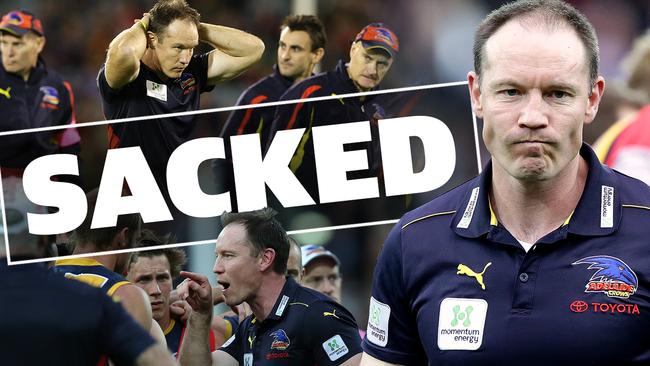
Add your comment to this story
To join the conversation, please log in. Don't have an account? Register
Join the conversation, you are commenting as Logout
Gather Round: Crows open again, Ken, Hawks set for blockbuster
One of the biggest moments of the AFL season came after the Power-Hawks final when Ken Hinkley told Jack Ginnivan he wouldn’t be flying to Sydney. Now we know when the rematch is coming.
Ralph: The key Dees developments that could save Goodwin’s job
Melbourne’s public review said it was capable of playing finals, but their game plan had to be refined, now the work begins for Simon Goodwin after a tumultuous 31 months, writes Jon Ralph.